Related Research Articles

"In the Mood" is a popular big band-era jazz standard recorded by American bandleader Glenn Miller. "In the Mood" is based on the composition "Tar Paper Stomp" by Wingy Manone. The first recording under the name "In the Mood" was released by Edgar Hayes & His Orchestra in 1938.

William Clarence Eckstine was an American jazz and pop singer and a bandleader during the swing and bebop eras. He was noted for his rich, almost operatic bass-baritone voice. In 2019, Eckstine was awarded the Grammy Lifetime Achievement Award "for performers who, during their lifetimes, have made creative contributions of outstanding artistic significance to the field of recording." His recording of "I Apologize" was given the Grammy Hall of Fame Award in 1999. The New York Times described him as an "influential band leader" whose "suave bass-baritone" and "full-throated, sugary approach to popular songs inspired singers like Earl Coleman, Johnny Hartman, Joe Williams, Arthur Prysock and Lou Rawls."

Mildred Bailey was a Native American jazz singer during the 1930s, known as "The Queen of Swing", "The Rockin' Chair Lady" and "Mrs. Swing". She recorded the songs "For Sentimental Reasons", "It's So Peaceful in the Country", "Doin' The Uptown Lowdown", "Trust in Me", "Where Are You?", "I Let a Song Go Out of My Heart", "Small Fry", "Please Be Kind", "Darn That Dream", "Rockin' Chair", "Blame It on My Last Affair", and "Says My Heart". She had three records that reached number one on the popular charts.
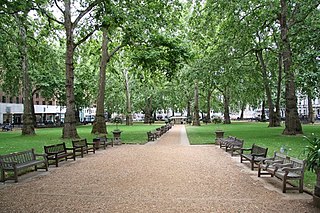
"A Nightingale Sang in Berkeley Square" is a romantic British popular song written in 1939 with lyrics by Eric Maschwitz and music by Manning Sherwin.

Glenn Miller and His Orchestra was an American swing dance band formed by Glenn Miller in 1938. Arranged around a clarinet and tenor saxophone playing melody, and three other saxophones playing harmony, the band became the most popular and commercially successful dance orchestra of the swing era and one of the greatest singles charting acts of the 20th century.
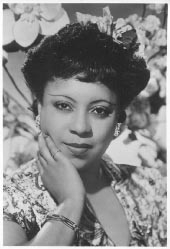
Adelaide Louise Hall was an American-born UK-based jazz singer and entertainer. Her long career spanned more than 70 years from 1921 until her death and she was a major figure in the Harlem Renaissance. Hall entered the Guinness Book of World Records in 2003 as the world's most enduring recording artist, having released material over eight consecutive decades. She performed with major artists such as Art Tatum, Ethel Waters, Josephine Baker, Louis Armstrong, Lena Horne, Cab Calloway, Fela Sowande, Rudy Vallee and Jools Holland, and recorded as a jazz singer with Duke Ellington and with Fats Waller.
Harry Roy was a British dance band leader and clarinet player from the 1920s to the 1960s. He performed several songs with suggestive lyrics, including "My Girl's Pussy" (1931), and "She Had to Go and Lose It at the Astor" (1939).
"I'll Get By " is a popular song with music by Fred E. Ahlert and lyrics by Roy Turk. The song was published in 1928. Versions by Nick Lucas, Aileen Stanley and, most successfully, Ruth Etting, all charted in America in 1929.
"I Should Care" is a popular song with music by Axel Stordahl and Paul Weston and lyrics by Sammy Cahn, published in 1944. Cahn said that the title came to him by the time they played the first 4 bars. It first appeared in the MGM film Thrill of a Romance. The original recording by Ralph Flanagan and His Orchestra, with vocalists: Harry Prime and The Singing Winds was made at Manhattan Center, New York City, on July 18, 1952. It was released by RCA Victor Records as catalog number 20-4885 and by EMI on the His Master's Voice labels as catalog number B 10389.
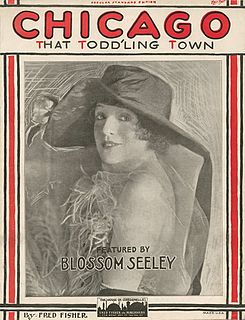
"Chicago" is a popular song written by Fred Fisher and published in 1922. The original sheet music variously spelled the title "Todd'ling" or "Toddling." The song has been recorded by many artists, but the best-known versions are by Frank Sinatra & Ben Selvin.

Harry Barris was an American popular singer and songwriter. He was one of the earliest singers to use "scat singing" in recordings. Barris, one of Paul Whiteman's Rhythm Boys, along with Bing Crosby and Al Rinker, scatted on several songs, including "Mississippi Mud," which Barris wrote in 1927.
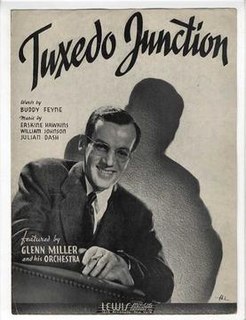
"Tuxedo Junction" is a popular song written by Erskine Hawkins, Bill Johnson, and Julian Dash with lyrics by Buddy Feyne. The song was introduced by Erskine Hawkins & His Orchestra, a college dance band previously known as the Bama State Collegians. RCA released it in 1939 and it climbed to #7 on the American pop charts. The song was a No. 1 hit for Glenn Miller & His Orchestra in 1940.

Lady Day: The Complete Billie Holiday on Columbia 1933–1944 is a 10-CD box set compiling the complete known studio master recordings, plus alternate takes, of Billie Holiday during the time period indicated, released in 2001 on Columbia/Legacy, CXK 85470. Designed like an album of 78s, the medium in which these recordings initially appeared, the 10.5" × 12" box includes 230 tracks, a 116-page booklet with extensive photos, a song list, discography, essays by Michael Brooks, Gary Giddins, and Farah Jasmine Griffin, and an insert of appreciations for Holiday from a diversity of figures including Tony Bennett, Elvis Costello, Marianne Faithfull, B.B. King, Abbey Lincoln, Jill Scott, and Lucinda Williams. At the 44th Grammy Awards on February 27, 2002, the box set won the Grammy Award for Best Historical Album of the previous year.

"Avalon" is a 1920 popular song written by Al Jolson, Buddy DeSylva and Vincent Rose referencing Avalon, California. It was introduced by Jolson and interpolated in the musicals Sinbad and Bombo. Jolson's recording rose to number two on the charts in 1921. The song was possibly written by Rose, but Jolson's popularity as a performer allowed him to claim composer co-credit. Originally, only Rose and Jolson were credited, and DeSylva's name was added later.
Anne Lenner (1912–1997) was a popular English female vocalist, singing with the dance bands of the 1930s and 1940s. She is most closely associated with Carroll Gibbons and the Savoy Orpheans, a band who regularly played at the Savoy Hotel in London; she made many studio recordings with this band. The British bands played a softer version of the swing jazz popular in the USA during the 1930s and 1940s.
"Ciribiribin"[t͡ʃi.ri.bi.ri.bin] is a merry Piedmontese ballad, originally in three-quarter time, composed by Alberto Pestalozza in 1898 with lyrics by Carlo Tiochet. It quickly became popular and has been recorded by many artists. Decades later it enjoyed continued popularity with swing and jazz bands, played in four-four time.
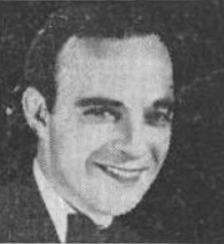
Dick Robertson was an American popular big band singer and songwriter of the 1930s and 1940s. He sang for many bandleaders such as Leo Reisman and Roger Wolfe Kahn and His Orchestra, and was on the artist roster at Banner Records. In fact, he was one of the most prolific New York based vocalists on scores of records from late 1928 through the mid 1930s. A series of records issued on Melotone/Perfect/Banner/Oriole/Romeo, Crown, Bluebird from 1930-1934 were issued under his name or are listed in the 2010 edition of "American Dance Bands on Record and Film (1915-1942)" by Richard J. Johnson and Bernard H. Shirley as being under his nominal leadership. His last recording session as a singer was in 1949. He also used the pseudonym Bob Richardson for some recordings on Mayfair Records.
"Ma, He's Making Eyes At Me", alternatively sung as "Ma, She's Making Eyes At Me", is a song published in 1921. The lyrics were by the American composer and comedian Sidney Clare, and the music was by the American songwriter and producer Con Conrad.
Helen Clare was a British singer who was well known in the 1930s and 1940s through her work in variety, radio, television and recording. Clare worked extensively in light entertainment, appearing on BBC Radio and recording with British dance bands. Her distinctive soprano voice saw her working with some of the biggest names of the era, including bandleaders Jack Jackson and Henry Hall. She was one of the last surviving British singers who had been active in the 1930s.
Ivor Moreton and Dave Kaye were an English musical variety double act who were known for performing syncopated piano duets together from the 1930s to 1950s. The duo consisted of pianists Ivor Arthur Moreton and David "Dave" Kaye, who had both been members of Harry Roy's dance band, the act developing from Roy's small group, the Tiger Ragamuffins. They played at two pianos, usually with Kaye carrying the melody, and Moreton embellishing it.
References
- ↑ "Joe Doaques Discography". Discogs.com. Retrieved 12 May 2016.
- 1 2 Video using the original Parlophone recording on YouTube
- ↑ "Harry Roy & his Mayfair Hotel Orchestra – She had to go and lose it at the Astor (1939)". Internet Archive . Retrieved 17 July 2009.
- ↑ Leigh, Spencer (2008). This Record Is Not to Be Broadcast: 75 Records Banned by the BBC 1931–1957 (liner notes). Acrobat Music Group. ACTRCD9015.